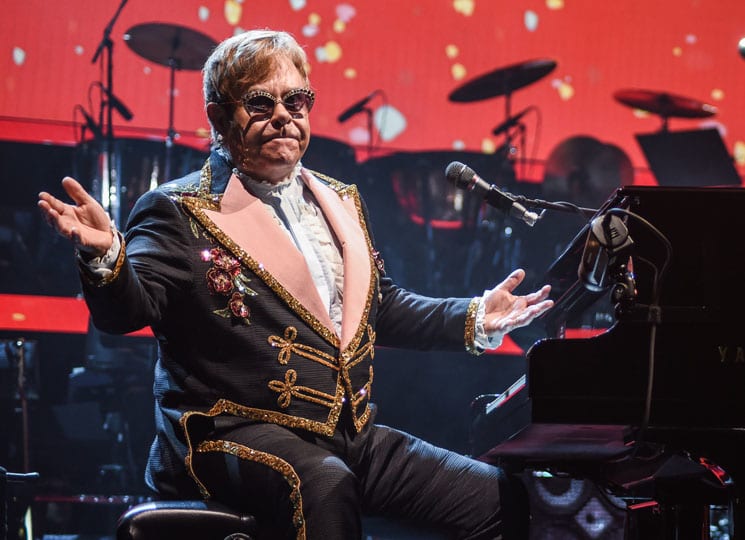At this point Elton John's music is like air — you know it even if you don't realize it. Yet behind the ubiquitous hits lies a deep discography that includes both heady concept albums and single-track gems well worth excavating.
Born Reginald Dwight, the songwriters changed his name to Elton John and paired up with lyricist Bernie Taupin; the two wrote with DJM Records before leaving to create John's 1969 debut, Empty Sky. It was a bust, but John had all the hallmarks of the singer-songwriter mould that would dominate the beginning of the next decade, and by the mid-'70s, he was one of the biggest pop-stars on the planet. Throughout the decade, John subverted any attempt to pigeonhole him. From his wildly versatile recordings to his wild antics onstage and off, he was a pop star, through and through, equally loved by fans and respected by critics.
Our Essential Guide to John's recordings offer a primer on the singer and pianist's prodigious studio output ahead of the release of the new film Rocketman, which charts John's rise, friendship with Taupin and subsequent struggles with depression, substance abuse and his sexual orientation. The movie stars Taron Egerton as John and opens May 31st.
Essential Albums:
5. Tumbleweed Connection
(1970)
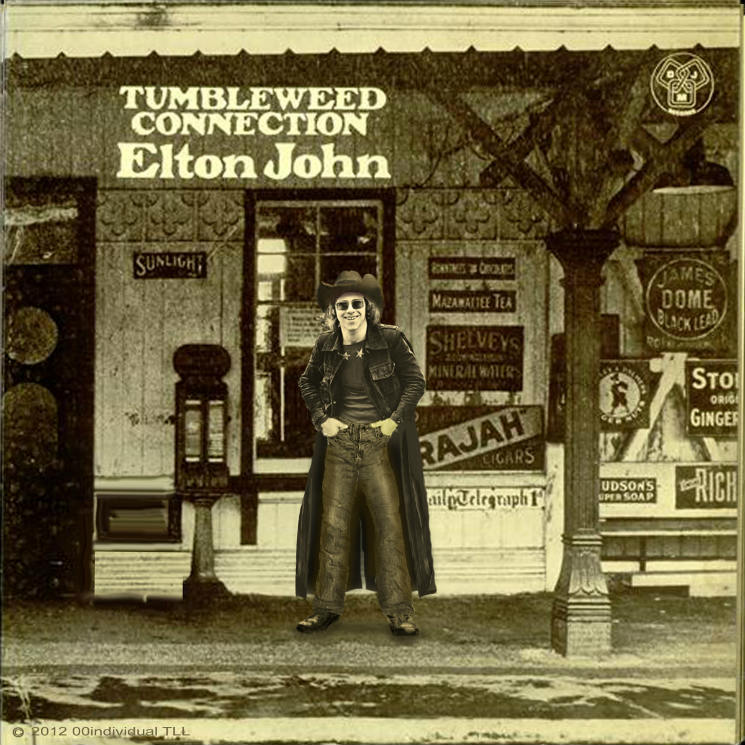
These days, John's music is pretty much synonymous with AOR radio, so it's difficult to imagine the fledgling star being associated with the Wild West that was FM broadcasting in the early '70s. Yet, inspired by the Band, Tumbleweed Junction's sprawling story-songs about the American West fit the free-form format perfectly. Though it produced no big hits, it's nevertheless an early creative highpoint that suggested the artistic ambition listeners were dealing with.
4. Madman Across the Water
(1971)
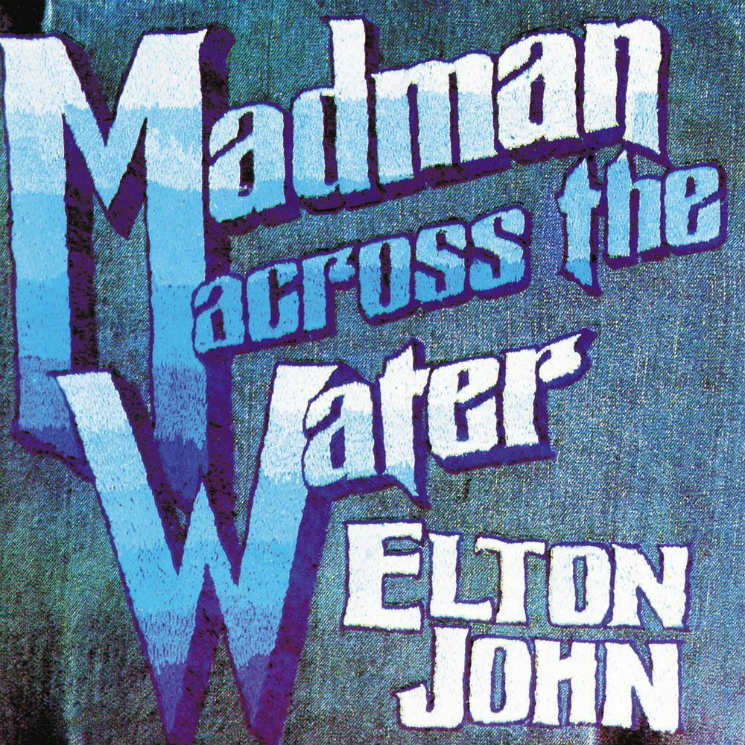
No sooner had Elton John hit upon his sound than he started to mess with it. After the rootsy experimentations of Tumbleweed Connection, John's next record balanced the simple character sketches of Elton John with more complex arrangements. Some of the production smacks of '70 schmaltz, but there's an underlying sadness that grounds songs like "Levon" even in the midst of a bevy of strings. Though today it's probably best remembered as "the one with 'Tiny Dancer,'" Madman showcases the deeply personal emotions that John brings to his best music, even when writing about fictional people.
3. Captain Fantastic and the Brown Dirt Cowboy
(1975)
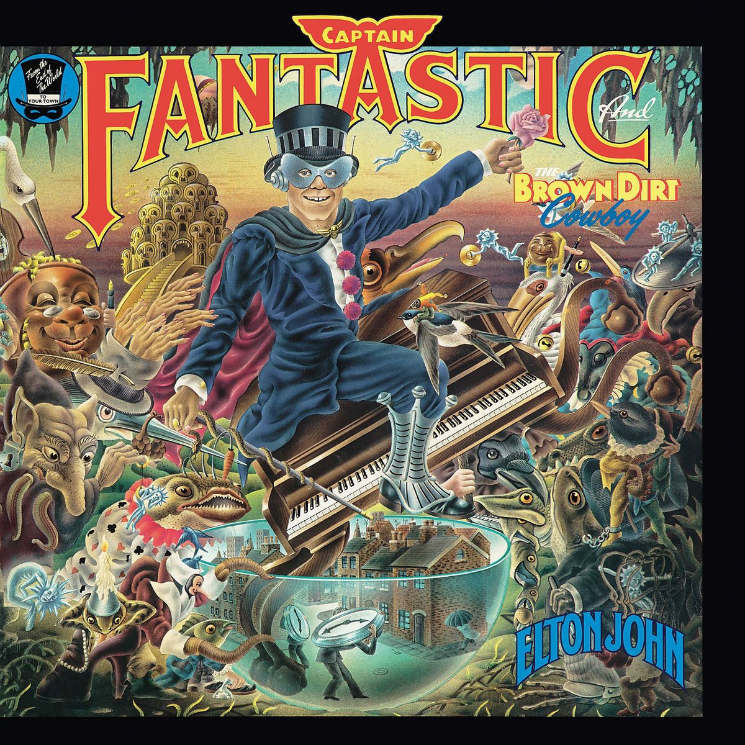
From "Tenth Avenue Freeze Out" to "Juicy," musicians love mythologizing themselves on record, especially their origin stories. Here John and Taupin look back on their early struggles through the lens of nearly unparalleled success, casting themselves as a larger-than-life superhero and his grounded partner. Unlike so many concept records of its era (and since), the songs stand on their own — a testament to John's skills as a pop arranger — while maintaining Taupin's coherent lyrical vision. Though it produced just one single (the brilliant, autobiographical "Someone Saved My Life Tonight"), it stands as John's most purely artistic triumph.
2. Honky Chateau
(1972)
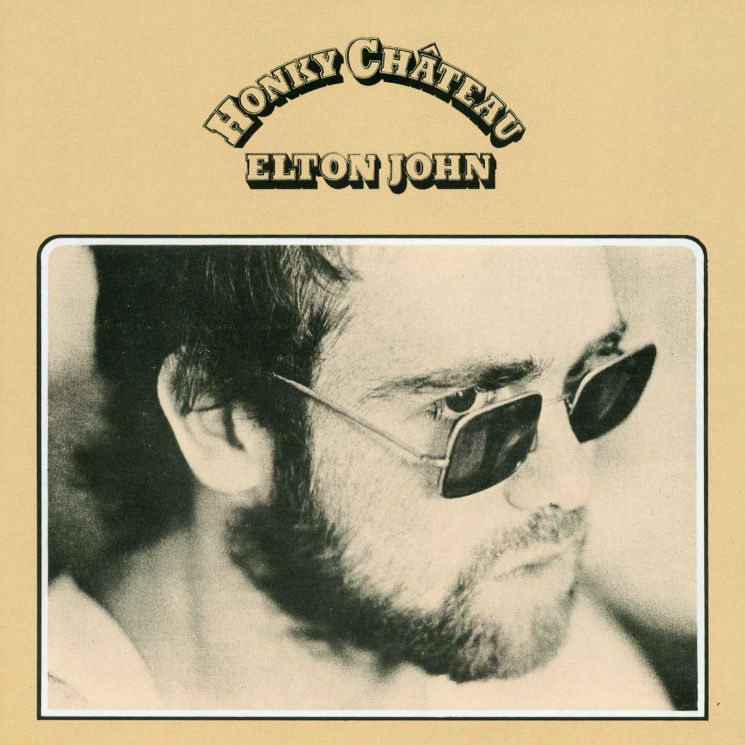
Looking back from a 21st century vantage, it's amazing how much leeway artists were given in finding their voices. John and Taupin had experienced success before it, but Honky Chateau is where everything they'd been working towards coalesced. Backed by his core live band, John finally hit upon that mix of rock ambition with pop songcraft, lifted by bassist Dee Murray, guitarist Davey Johnstone and drummer Nigel Olsson's soaring backing vocals, especially on the "Rocket Man (I Think It's Going to Be a Long, Long Time)." Bonus points for the excellent deep cut "Mona Lisas and Mad Hatters," the other Elton John track from Almost Famous.
1. Goodbye Yellow Brick Road
(1973)
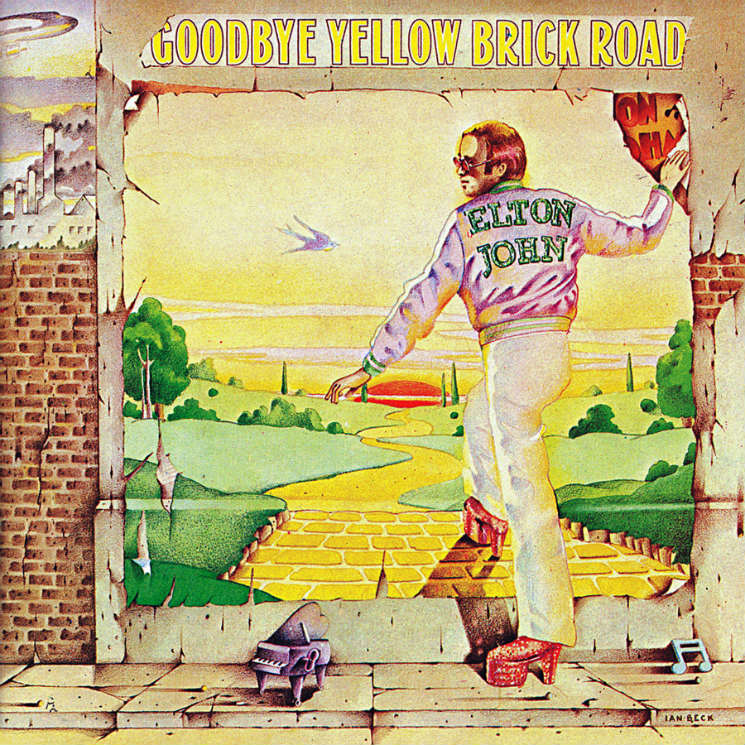
Perhaps John's greatest feat during his imperial phase (1970 to 1975) was his ability to blend ambition with emotional resonance and a strong pop sensibility. That reached its zenith on Goodbye Yellow Brick Road, the first of two double albums he'd release during that period. Captain Fantastic is the more realized album conceptually, but the nostalgic Goodbye Yellow Brick Road makes up for the lack of a coherent narrative with its sheer scope of genre, mood and personality. A baroque pop masterpiece.
Further Listening:
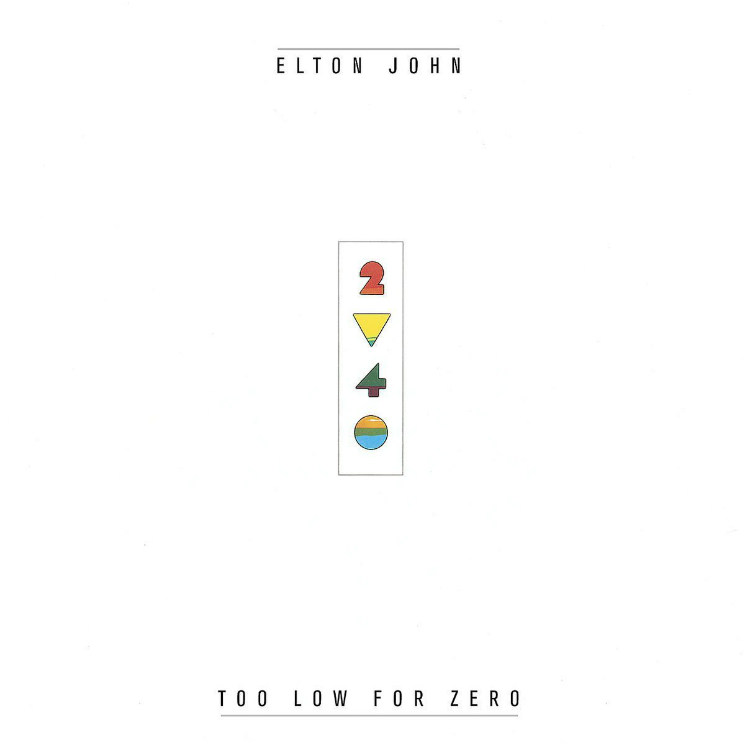
For those who've yet to take a purposeful plunge into his vast discography, there are plenty of hits compilations you can use to orient yourself. The 17-times platinum Elton John's Greatest Hits from 1974, and its 1977 and 1987 Volume II and Volume III follow-ups, are the "classic" comps. But if you're looking for a more career-spanning and economical collection, the double disc, (mostly) chronologically sequenced Greatest Hits 1970-2002 gives a good overview, while separating the wheat from the chaff during the dodgier phases of his career.
Between 1970 and 1975 John released nine studio albums, all ranging from great to all-time classic. Given its competition, Caribou (1974) is perhaps the least successful artistically of this period, but would be dubbed a crowning achievement in most artists' careers. Ditto Don't Shoot Me, I'm Only the Piano Player (1973); an exercise in style over substance, the so-called "filler" here is only filler in comparison to its hits, like "Crocodile Rock" and "Daniel." His self-titled 1970 breakthrough lacks the diversity and ambition of what was to come, but listening today, its understatedness is its strength. Similarly, the live album 17-11-70 captures John at an early peak, showcasing deep cuts that would soon be overshadowed by a cavalcade of hits.
The grand narrative of John's career is that the end of the '70s sees him enter an artistic decline that would last through the 1980s. That's not an entirely untrue characterization, but it glosses over a number of highlights from this period. Chief among them, 1983's "comeback" record Too Low For Zero (pictured), his first record with Taupin since 1976's Blue Moves. This rocky period wasn't without its highlights though, most of which are conveniently captured on his third hits collection.
By the end of the '80s, John had cleaned up drug-wise, and in 1992, he fully came out of the closet publically. The decade is probably best remembered for John's maudlin contributions to animated film soundtracks and Broadway Musicals, with lyricist Tim Rice, but "Believe" from 1995's Made in England is a standout from the era.
John experienced an unexpected artistic return to form in the 2000s, starting with the 2001 record Songs from the West Coast. The record was anchored by the singles "This Train Don't Stop There Anymore" starring Paul Reubens and Justin Timberlake, and "I Want Love" and its surprisingly poignant music video starring Robert Downey Jr. It was followed by the equally well-received Peachtree Road (2004) and The Captain & the Kid (2006), a sequel to Captain Fantastic. This period was capped off with The Union (2010), a collaboration with lifelong hero Leon Russell, which Rolling Stone named the third best album of the year.
Born Reginald Dwight, the songwriters changed his name to Elton John and paired up with lyricist Bernie Taupin; the two wrote with DJM Records before leaving to create John's 1969 debut, Empty Sky. It was a bust, but John had all the hallmarks of the singer-songwriter mould that would dominate the beginning of the next decade, and by the mid-'70s, he was one of the biggest pop-stars on the planet. Throughout the decade, John subverted any attempt to pigeonhole him. From his wildly versatile recordings to his wild antics onstage and off, he was a pop star, through and through, equally loved by fans and respected by critics.
Our Essential Guide to John's recordings offer a primer on the singer and pianist's prodigious studio output ahead of the release of the new film Rocketman, which charts John's rise, friendship with Taupin and subsequent struggles with depression, substance abuse and his sexual orientation. The movie stars Taron Egerton as John and opens May 31st.
Essential Albums:
5. Tumbleweed Connection
(1970)

These days, John's music is pretty much synonymous with AOR radio, so it's difficult to imagine the fledgling star being associated with the Wild West that was FM broadcasting in the early '70s. Yet, inspired by the Band, Tumbleweed Junction's sprawling story-songs about the American West fit the free-form format perfectly. Though it produced no big hits, it's nevertheless an early creative highpoint that suggested the artistic ambition listeners were dealing with.
4. Madman Across the Water
(1971)

No sooner had Elton John hit upon his sound than he started to mess with it. After the rootsy experimentations of Tumbleweed Connection, John's next record balanced the simple character sketches of Elton John with more complex arrangements. Some of the production smacks of '70 schmaltz, but there's an underlying sadness that grounds songs like "Levon" even in the midst of a bevy of strings. Though today it's probably best remembered as "the one with 'Tiny Dancer,'" Madman showcases the deeply personal emotions that John brings to his best music, even when writing about fictional people.
3. Captain Fantastic and the Brown Dirt Cowboy
(1975)

From "Tenth Avenue Freeze Out" to "Juicy," musicians love mythologizing themselves on record, especially their origin stories. Here John and Taupin look back on their early struggles through the lens of nearly unparalleled success, casting themselves as a larger-than-life superhero and his grounded partner. Unlike so many concept records of its era (and since), the songs stand on their own — a testament to John's skills as a pop arranger — while maintaining Taupin's coherent lyrical vision. Though it produced just one single (the brilliant, autobiographical "Someone Saved My Life Tonight"), it stands as John's most purely artistic triumph.
2. Honky Chateau
(1972)

Looking back from a 21st century vantage, it's amazing how much leeway artists were given in finding their voices. John and Taupin had experienced success before it, but Honky Chateau is where everything they'd been working towards coalesced. Backed by his core live band, John finally hit upon that mix of rock ambition with pop songcraft, lifted by bassist Dee Murray, guitarist Davey Johnstone and drummer Nigel Olsson's soaring backing vocals, especially on the "Rocket Man (I Think It's Going to Be a Long, Long Time)." Bonus points for the excellent deep cut "Mona Lisas and Mad Hatters," the other Elton John track from Almost Famous.
1. Goodbye Yellow Brick Road
(1973)

Perhaps John's greatest feat during his imperial phase (1970 to 1975) was his ability to blend ambition with emotional resonance and a strong pop sensibility. That reached its zenith on Goodbye Yellow Brick Road, the first of two double albums he'd release during that period. Captain Fantastic is the more realized album conceptually, but the nostalgic Goodbye Yellow Brick Road makes up for the lack of a coherent narrative with its sheer scope of genre, mood and personality. A baroque pop masterpiece.
Further Listening:

For those who've yet to take a purposeful plunge into his vast discography, there are plenty of hits compilations you can use to orient yourself. The 17-times platinum Elton John's Greatest Hits from 1974, and its 1977 and 1987 Volume II and Volume III follow-ups, are the "classic" comps. But if you're looking for a more career-spanning and economical collection, the double disc, (mostly) chronologically sequenced Greatest Hits 1970-2002 gives a good overview, while separating the wheat from the chaff during the dodgier phases of his career.
Between 1970 and 1975 John released nine studio albums, all ranging from great to all-time classic. Given its competition, Caribou (1974) is perhaps the least successful artistically of this period, but would be dubbed a crowning achievement in most artists' careers. Ditto Don't Shoot Me, I'm Only the Piano Player (1973); an exercise in style over substance, the so-called "filler" here is only filler in comparison to its hits, like "Crocodile Rock" and "Daniel." His self-titled 1970 breakthrough lacks the diversity and ambition of what was to come, but listening today, its understatedness is its strength. Similarly, the live album 17-11-70 captures John at an early peak, showcasing deep cuts that would soon be overshadowed by a cavalcade of hits.
The grand narrative of John's career is that the end of the '70s sees him enter an artistic decline that would last through the 1980s. That's not an entirely untrue characterization, but it glosses over a number of highlights from this period. Chief among them, 1983's "comeback" record Too Low For Zero (pictured), his first record with Taupin since 1976's Blue Moves. This rocky period wasn't without its highlights though, most of which are conveniently captured on his third hits collection.
By the end of the '80s, John had cleaned up drug-wise, and in 1992, he fully came out of the closet publically. The decade is probably best remembered for John's maudlin contributions to animated film soundtracks and Broadway Musicals, with lyricist Tim Rice, but "Believe" from 1995's Made in England is a standout from the era.
John experienced an unexpected artistic return to form in the 2000s, starting with the 2001 record Songs from the West Coast. The record was anchored by the singles "This Train Don't Stop There Anymore" starring Paul Reubens and Justin Timberlake, and "I Want Love" and its surprisingly poignant music video starring Robert Downey Jr. It was followed by the equally well-received Peachtree Road (2004) and The Captain & the Kid (2006), a sequel to Captain Fantastic. This period was capped off with The Union (2010), a collaboration with lifelong hero Leon Russell, which Rolling Stone named the third best album of the year.
